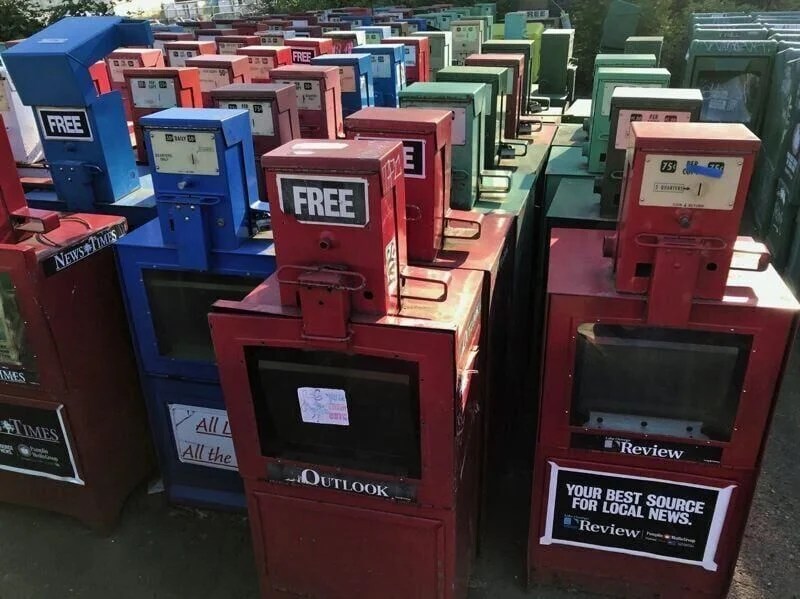Opinion: Oregon bill opens discussion about paying for journalism
Published 6:38 am Thursday, May 15, 2025

- Newspaper racks stacked outside the former Pamplin Media Group headquarters. (Dana Haynes)
No easy or obvious solution will resolve one of the top and less-acknowledged crises in America, the collapse of local and regional news reporting. Whether Oregon Senate Bill 686 passes or fails, it should at least open a discussion about improving the ability of Oregonians to get the information they need to govern themselves.
The problem is obscured a little by the fact that most news outlets in the state haven’t disappeared completely, and a few new ones (the Oregon Capital Chronicle, for one example) have arisen.
Good journalism is still being done in the state, but much less comprehensively than two or three decades ago. But the newsgathering capacity is a sliver of what it was at the century’s turn, the number of journalists in newsrooms way down. Broadcasters have seen serious cutbacks too.
There’s little coverage now of local city councils, county commissions, school boards and more. Local angles on the work of legislators and state and federal officials is nearly gone.
The larger picture is of a balloon, once full, but now with its air mostly having run out.
This would be only a business problem except that it means we’re not getting the information about our government, our politics, our society, our problems and our successes as we did not long ago. That gap, and the rise of misinformation to massive levels, has become one of our great national crises.
Enter SB 686, which intends to at least provide some help. It is not a totally new idea, being a variation on similar attempts in other places (California and Canada for two), to direct public assistance toward civic journalism.
The operating idea comes from one of the (many) reasons for journalism’s economic collapse, the use of locally-created news reports with little or no compensation in online media platforms — think here of Google and Facebook, with others as well. The idea is to force those platforms, which have been swimming in profits in recent years, to help pay for production of local news either through fees to the organizations, or by way of arbitration, or a contribution to a new Oregon Civic Information Consortium.
The bill, which at this writing seems to be progressing steadily through the legislature, has understandably drawn lots of testimony. Critics, including the social media platforms, have raised legal questions about it, and the tech giants have suggested that Oregon news reports might be restricted or even banned on places like Facebook or Google. Other questions include how much money might be involved, and exactly how it would be spent. ($122 million has been one estimate noted, but that’s not at all definitive.)
Less discussed: What results Oregon news consumers might see, provided the bill passes and survives legal challenges.
If any of the big platforms — from Facebook to Google — did decide to block Oregon news, that might send most Oregon news readers elsewhere, and maybe back in larger numbers to Oregon news sites. Many of Oregon’s newspapers and broadcasters have highly active websites that could become a boon for those companies with an additional readership push.
A shift away from the mega-platforms also might reshuffle access to news. National news has had aggregate sites like Drudge or Memeorandum for years, and many people have used them. Oregon has some lesser-known aggregators too, such as the right-leaning Oregon Watchdog, and these might become more popular, or a new generation of them might be developed.
Suppose the platforms agreed to pay up? That’s a realistic prospect; California and Canada, after launching legislative efforts that loosely resemble Oregon’s, have extracted money from them for journalism. The platforms are understandably concerned about similar initiatives in 50 states and beyond, but the reality is they can easily afford it.
How much good would it do? In some cases, newsrooms might be beefed up somewhat, and in other places where newsgathering has collapsed, it might be reinvigorated, at least somewhat.
The upside looks good, and the downside risk doesn’t seem large.
Consider a small city in a small county whose newspaper has disappeared or has hardly any remaining presence. If two journalists were hired, with money for training and support, that could make a lot of difference, resulting in significant coverage of the area. The remaining questions would involve how to get people to check it out.





